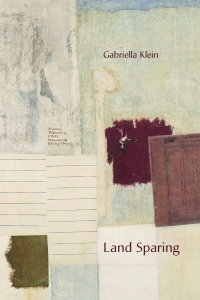
Reviewed April 1, 2017 by Karen An-hwei Lee.
“To live rejoicing and true-footed. / A common prayer.” So begins a radiant debut, Land Sparing, Gabriella Klein’s sensual, intelligently felt lyric which turns our attention to a shining eco-poetical awareness, rooted in the beauty of the profoundly earth-bound yet anthropocentric. Exploring the mediated experiences of a hybridized natural world, Klein layers a lexical elegance of the empirical (“allometry and isometry”) with waves of passion coloring the intricacies of our relationships, at once ironically personal and playfully self-referential.
from “Bracket”
A tree lying down
becomes a sentence.
Orthography won’t save us.
Delete, delete.
Klein’s lyric meditations on abstract or tangible structures, whether engineered or organic, immerses a vigilant reader in the open mindfulness of intimacy and delightful estrangement with distant echoes of Emily Dickinson’s ecstatic pulse and the fine handiwork of Jen Bervin’s exquisitely stitched texts.
from “The Honeycomb Conjecture”
If a bee is busy, too busy
to feel woe. Or the absence
of pollen, which is to say, lonely.
I would lie with you
in the open road.
. . .
Inside us
lives a colony of space.
While the poems, collectively, harmonize melodious strains of eco-poetical grief and gratitude, Klein’s precise eye and ear for imagery and musical line is occasionally punctuated, distinctively and effectively, by a wry sense of humor.
from “You Are a Bird of Paradise"
Technology is ruining my handwriting
but not my sense of smell. Night-blooming,
we arrive to the slowing in the southbound lane.
Land Sparing is never darkly cynical nor dystopic. Rather, a quiet promise of rejuvenation hums patiently, if not prayerfully, resonating in its clear-eyed couplets, single lines, and stanzas: so much is spoken-into-being with an economy of words.
from “Draft Conclusions”
We will reforest
the forests
with medicine and moths
with see through wings.
A lovely book-object with soft–cover flaps and grayscale collages of delicate hand-torn paper, Land Sparing includes, at interludes, visual textures in a sequence of forays into a de-textualized or re–textualized world, populated by a renewed human respect for the earth and the imagined potential of a paradise existing within — or beyond — the exhausted tumult of our “technophile” millennium.
from “Seven Lakes”
Elegance, succulence. The world
best left alone.